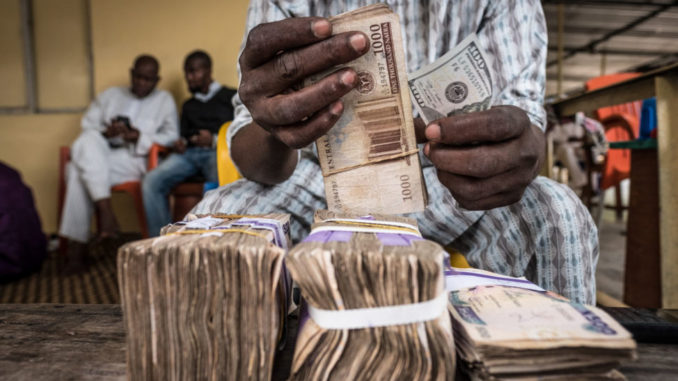
The Central Bank of Nigeria Governor Godwin Emefiele has said, “We will continue to operate a managed float exchange rate regime in order to reduce the impact with continuous volatility in which the exchange rate could have on our economy”. But in reality and contrary to that statement, which is contained at paragraph 23 of the 2019-24 Policy Thrust of the CBN enunciated on 24/6/19, what has operated over the years can only be characterised as handicap-the-naira exchange rate system (HNS), which puts the naira at a disadvantage. The key features of the HNS, a pseudo-forex market, are deliberate forex under-supply and forced exaggerated forex demand, which predispose the naira to depreciate.
The factors responsible for reduced forex supply to the HNS market include, firstly, the ex-military regime-dictated withholding of Federation Account dollar allocations in favour of disbursement of prorata CBN fiat printed (that is, deficit) naira funds to the tiers of government for budgetary spending. Only a reduced stream of forex by way of CBN interventions reaches the HNS market intermittently from the CBN withheld Federation Account dollar allocations (which are inappropriately dubbed CBN’s external reserves).
Secondly, the country’s invisible export proceeds are intercepted by vampiric profit-maximising forex-dealer deposit money banks and prevented from being transacted directly in the HNS market. Note in this regard that remittances from Nigerians in the Diaspora run into US$26 billion annually. Proof that such significant invisible export earnings do not influence the HNS market is contained at paragraph 5 of the above cited Policy Thrust which states, “Nigeria’s dependence on crude oil revenues (is) close to 86 percent of our foreign exchange earnings”, which is incorrect. Also CBN Quarterly Economic Reports (QERs) show that the invisible sector accounts for about 60 percent of sectoral utilisation or transfer of forex cut or the system every quarter but the QERs do not indicate any corresponding Nigerian invisible export receipts.
Thirdly, a significant proportion of the above utilised, forex by the invisible sector gets sequestered in forex domiciliary accounts thereby swelling and sustaining multiple currency practices (MCP) which were decreed into existence in 1995 under the military regime. Private sector export earnings including foreign direct investment funds of establishments like international oil companies are also warehoused in forex domiciliary accounts. Forex domiciliary account funds in domestic banks are not legal tender and so breach Section 2(b) of the CBN Act 2007and violate relevant monetary items on the Exclusive List of the 1999 Constitution. Such funds represent adversary-currency holdings which constantly wage war on the naira: they are primed to subjugate the economy. The enemy-of-naira mindset of domiciliary forex account holdings manifests as follows: the Investors’ and Exporters’ rate of N360/$1 contains a well-schemed premium of 18 percent (and domiciliary account holders yearn for higher and higher premium) over the Appropriation Act exchange rate of N305/$1 whereas to the mainstream naira account holding citizenry, the I&E rate denotes 18 percent devaluation with attendant individual lowered purchasing power and ruinous inflationary macroeconomic privations. To prevent the enemy currencies from continuing to destroy the naira economy from within, funds in forex domiciliary accounts should be promptly transacted in the single forex market. Surplus forex not purchased by eligible forex end-users should be sold to the CBN (the conventional depository of unutilised public and private sector-generated foreign currencies) to boost genuine external reserves.
Pertinently, the Nigerian Law Reform Commission in 2016 proposed a bill prescribing that forex lodged in domiciliary accounts be subject to a short time limit and, so restore the primacy and exclusive legal tender status of the naira. Even one could ignore’the unpassed NLRC bill as superfluous while trusting that the President of the Federal Republic of Nigeria, the President of the Senate and the CBN Governor will be guided by their respective oaths of office and will implement beneficial monetary laws. The harmful role of domiciliary forex accounts has been established. So between, on the one hand, the Foreign Exchange (Monitoring and Miscellaneoug Provisions) Decree 1995 (renamed Act in 2004), which instituted adversary non-legal tender domiciliary foreign currency accounts that subvert and subjugate the naira legal tender and, on the other hand, the CBN Act 2007 which reaffirms the exclusive legal tender status of the naira, which law should be in operation today that better serves the national economic interest?
As regards forex demand, the HNS market ignites exaggerated forex demand, The excess liquidity arising from the earlier noted substitution of withheld FA dollar allocations with CBN deficit financing of the tiers of government alongside the attendant depreciating naira not only induces flagging confidence in the domestic currency but also heightens preference for hard and appreciating foreign currencies that could be freely lodged in the safe haven provided by forex domiciliary accounts. The bulk of the funds kept in domiciliary forex accounts finds use in a counter-economy such as (i) subscription to Eurobonds which have become part of the FG external debts; (ii) financing government revenue-evading smuggling activities to the detriment of domestic agricultural and industrial production; (iii) treasury looting for stashing away in private foreign bank accounts; and (iv) overindulgence of overgrown taste buds for foreign swanky goods and. services. Additionally, foreign portfolio investors swoop in and scoop the country‘s forex. Although the government sector is grossly underproductive, the high inflation-induced high interest rate: regime attracts foreign portfolio investments in government bonds. Such inflows are not geared towards supporting development of the economy but towards dissipation of the national wealth. In the final analysis, it is easy for the country to generate three months’ import cover volume of external reserves, which is all the country needs at any point in time for balance of payment purposes. Domestically accumulated external reserves in excess of that amount can be utilised for domestic developmental requirements (if need be) without inviting predatory foreign portfolio investments.
To be continued tomorrow
Ojomaikre is visiting member, Editorial Board, The Guardian


Be the first to comment